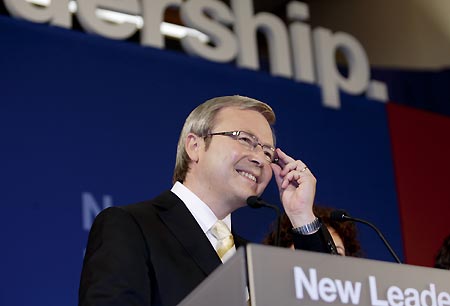Australian Labor elected with view for change
Updated: 2007-11-25 08:40
CANBERRA - The Australian Labor Party ousted PM John Howard's 11-year-old government in the general election with the view for a change.
 Opposition Labor Party leader Kevin Rudd celebrates the victory of Labor Party in the Federal election in Brisbane, Nov. 24, 2007. [Xinhua] |
Kevin Rudd won the election as a new leader amongst the long-heard voices for the change of government, when voters complained on Howard's reforms in industrial relations and rising interest rates.
Howard's reliance on the country's economic achievements did not help his re-election campaign as before, as Rudd pointed to the failure of transferring the benefits of a booming economy to the families.
Rudd asked, "the economy is strong, but why life is hard?"
Rudd promised that when in power, he will, among other things, scrap the unpopular Workplace Agreements, and to "get the balance right between fairness and flexibility in the workplaces of the nation."
He highlighted projects in education and health care, the two areas where he has been long ahead of Howard in public opinion polls.
Climate change has been in the focus of election debate as Rudd vowed to rectify the Kyoto Protocol the Coalition has refused to ink in fear of a possible impact on Australia's economy. A cut of greenhouse gas emissions by 60 percent by 2050 is also on Labor's agenda.
Although there is not much difference between Labor and Coalition on foreign affairs, Rudd wants a staged withdrawal of Australia's combat troops from Iraq by mid next year.
In contrast, Howard, as a closest ally of U.S. President George W. Bush, would keep the soldiers there "as long as they are needed."
It is expected a Labor government will seek to promote Australia's influence in the South Pacific, as Rudd has criticized Howard's regional policy.
Labor plans to build a regional center of civil-military cooperation and use it as a platform to train police and coordinate regional assistance missions.
Earlier in the polling day, about 13.6 million voters across Australia chose from 1,421 candidates for all the 150 seats in the House of Representatives and 40 of the 76-member Senate.
As the count of votes still continues, the exact number of seats Labor has won in the parliament remains unknown, but analysts of local TV stations which broadcast at the national tally room put it above 80.
|
|
|
||
|
||
|
|
|
|